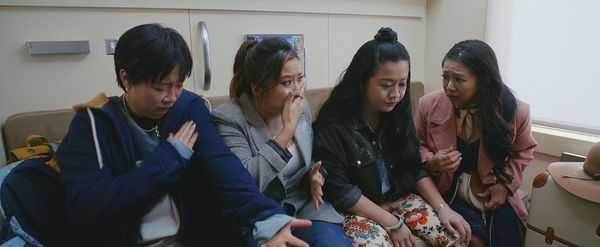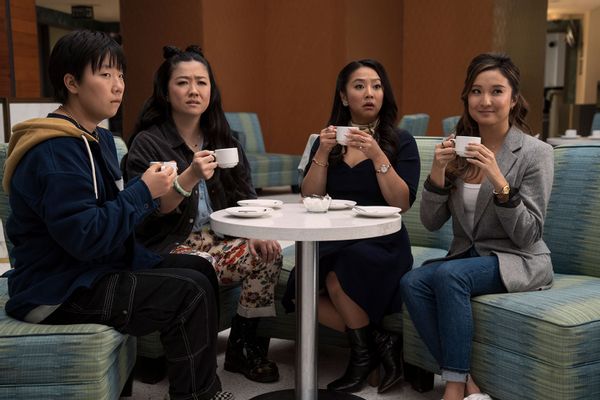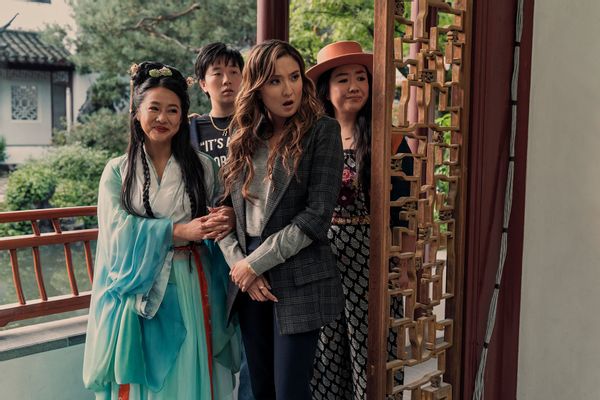
It's easy to see your own friend group's banter in the merciless teasing and candor of the crew in "Joy Ride." As its name suggests, the road trip comedy directed by Adele Lim, is indeed a wild ride, full of risqué jokes, tearjerking realizations about identity, reclamations of Asian women's sexuality and heartfelt friendship. The movie's ensemble easily riffs off of one another as they come to learn how they best fit together, an onscreen chemistry that has already won them the Comedy Ensemble of the Year Award. This is owed in large part to how they were written and inspired by real friends.
"We're disgusting, so it's just what came out of our brains."
Co-written and co-produced by Teresa Hsiao and Cherry Chevapravatdumrong, "Joy Ride," follows Audrey (Ashley Park), an ambitious lawyer in suburban California who was adopted and raised by white parents. A work trip to China provides an opportunity to find her birth mother, becoming a much messier trip than Audrey bargained for. Joining her is her best friend and thirsty artist Lolo (Sherry Cola) who, unbeknownst to Audrey, has invited along her cousin Deadeye, a K-pop stan with a former penchant of lighting things on fire. In Beijing, things go quickly awry, as the crew meet up with Audrey's college bestie and Lolo's rival BFF, Kat (Stephanie Hsu). Having moved to China to pursue acting in Chinese dramas (aka C-dramas), Kat is a retired "bad girl," now engaged to her pure and religious co-star Clarence (Desmond Chiam).
All of these wildly differing personalities, like Audrey, eventually come to crystallize their own identity over the course of the trip. But Hsiao and Chevapravatdumrong juggle the group's chemistry and, at times, contentions with grace, all while staying true to each character's strong, authentic identity.
The duo met on the job and quickly hit it off. "We locked eyes in the 'Family Guy writers' room," Hsiao tells Salon over Zoom. "There was another Asian woman amongst this sea of white guys, and we ran towards each other and hugged and never let go," continued Chevapravatdumrong. That was nearly a decade ago, and they've been holding on ever since.
For Chevapravatdumrong who's worked on "The Orville," and Hsiao who came to the project by way of "Awkwafina Is Nora From Queens," comedy writing is their bread and butter. Their experience collaborating for TV helped them make the process of writing the movie that much smoother, trading sections based on which felt the most like them and dividing the work. But their personal relationship was also an integral part in creating the story.
"This whole movie is about friendship. It's about how friends interact and get into shenanigans and high jinks with each other. So we were drawing a lot from our own lives and from our friends' lives as the base inspiration for the script," said Chevapravatdumrong.
Check out the rest of Salon's interview with the pair, as they break down the characters, the beauty of the BTS fandom and rewriting who gets to be horny.
The following interview has been lightly edited for length and clarity.
Could you talk about how you both came to work on this project?
Cherry Chevapravatdumrong: This was basically born out of real life friendship. Teresa and Adele and I have been friends for years. At some point, we were just like, "You know what? Wouldn't it be fun if we wrote a movie that we would have loved to have seen growing up?" So we would sit around together eating dinner, hanging out at each other's houses and just kind of started loosely breaking this story. Then, when it came time to actually write the thing, Teresa and I, as the comedy writers, took the outline that we came up with and ran with it. We just started trying to make each other laugh and then typing those things down. Months later, a script appeared.

Chevapravatdumrong: We're disgusting, so it's just what came out of our brains. We always knew it was gonna be this hard R, R-rated comedy, because that's our natural sensibility. With the full-frontal female nudity, obviously we wanted to make it funny and we wanted to push some extremes, but specifically for that, we were just trying to make each other laugh and then write the funniest thing possible that's also funny for any audience.
"Representation for p***y tat people."
The female sexuality part, it was definitely in the back of our minds. We kept it in our heads that female sexuality in previous R-rated movies — or in previous movies just in general — is usually played for sexuality. It is played for titillation. It is played as females are the hot sexy ones, and male nudity, that's the stuff that's usually mined for jokes. We wanted to flip that a little. Nudity representation matters. So that's why we wanted to explore that and use the humor of female sexuality for the first time.
Teresa Hsiao: Representation for p***y tat people. In this movie, the characters are allowed to be wild and raunchy, but they're doing it on their own terms. When you look back at a lot of these other movies, the women are the nags or they're there to be the foil. Whereas in our movie, our characters are the ones making the jokes, but also being the butt of the jokes because they can. I think that's super important in terms of being able to see a wide spectrum of Asian characters on screen.
Definitely, I love the scene when the characters finally have sex and then they end up literally breaking the men's basketball team. I feel like "Joy Ride" really takes that TV raunchy comedy genre and puts a much more like feminine spin on it. Can you talk a little bit about adapting that genre under the female, and particularly Asian female, gaze?
Chevapravatdumrong: I don't think we necessarily set out to do that. It's not like we sat down and were like, "OK, we're gonna write a movie and we're gonna make sure it's Asian female gaze." It's just: We're going to write a movie. We want to write something that's really funny, and because of who we are, this is the material that naturally flowed out of us. I feel like Teresa has the best phrase for it, which is we're kind of Trojan horse-ing all of these subtle messages about representation and about equality underneath our characters in our story and our comedy.
Hsiao: But it was never our intention. We never wheeled the horse out like let's make sure we get this Asian representation message and this female sexuality message. I think just because we wrote the movie and the fact that it exists is sort of the message in and of itself. I think that the first message that we always wanted [people] to take away was, "Oh, that was a really funny movie." And then, if that inspires people or gets people talking about all these other things, then that's amazing. But we want people to have a fun time. The types of comedies that we really enjoy are the ones that are very funny first, but that gets you thinking about other things.
I feel like that also makes the movie feel much more authentic, especially when it comes to the characters. They felt very strong and relatable. When it comes to developing Ashley's character, Audrey, did you always know that she would be a transracial adoptee. What research or conversations went into that depiction?
Hsiao: We have friends who are adopted; we talked to a lot of them. We've read a lot of books and articles. Obviously we wanted to treat it with a lot of care in that we are not adopted ourselves, but a lot of times as writers you end up writing about experiences that you don't necessarily have. We definitely talked to a lot of people about her journey, what we wanted our character's journey to be.
"Definitely growing up was like, 'I don't want to speak Chinese in front of my friends. I don't want to do Asian things in front of my friends because I want to fit in.'"
We don't know what it's like to be adopted — we do know what it's like to be the only Asian person in a town where no one looks like you. So that identity journey was really baked into Audrey's story, as well. This journey about feeling like you need to assimilate in this place, you need to fit in, you need to be excellent. So much of her story, even though yes, it's an adoptee story, it's also a story about identity and ultimately friendship. That friend that you had growing up – are they still your friend when you're an adult? Life changes around you. And so really trying to make that character multifaceted in ways that really are above and beyond just the adoptee story.

Hsiao: Just real life people and, again, ourselves as well. If we're going to get real deep about this, I definitely growing up was like, "I don't want to speak Chinese in front of my friends. I don't want to do Asian things in front of my friends because I want to fit in." It's the "Oh, I want to get Lunchables instead of the lunch my mom makes me." Definitely so many of the characteristics of Audrey are ripped from the headlines of our own lives.
Chevapravatdumrong: The lunch thing I can relate to. In adulthood, it happened to me. Working at some of my first assistant jobs after having moved to LA, you bring lunch that's a little Asian or that's a little weird and then somebody else makes a comment on it. As a child you're just like, "Oh man, I wish I had a normal sandwich like everyone." But guys, fried rice is delicious, you know what I mean?
There's a scene with Lolo where I noticed she uses chopsticks to eat a bag of chips, which I think that's such a great, specific character detail and something I've done myself. How did this detail come about? Was it written into the script or was it added while filming?
Chevapravatdumrong: We do that. Are we typing and trying to eat Hot Cheetos at the same time? No, you're trying to keep your keyboard clean. That is something that we do that we talked about doing.
Hsiao: Yeah, it was definitely in the script. And also right there in that shot, you see Lolo doing that with chopsticks and then Audrey just going in with her fingers and eating. So just seeing that difference between the two of them was something that was definitely intended.
Can we also talk a little bit about Kat, who grew up in the West but is working in China, which creates maybe a little bit of dissonance about how she's supposed to compose herself, going from this party girl to someone who is more pure and prim. What or who inspired this character?
Chevapravatdumrong: We definitely know people, and I feel like a lot of people know people, who were like that. In college, they raged. And then as we get a little older, you get more responsible, you get a job, you change your lifestyle a little bit, you leave that part of yourself behind simply because you're getting older, you're growing up. So it's basically that vibe and then we took it to the extreme for Kat.
Hsiao: I think also Kat's really responding to the C-dramas. Especially in these Asian dramas, there's the good girl and she has taken on this persona as the good girl. And I think she is someone who, because society tells her to, embodied this good girl aspect. It's nice to see that she kind of gets a little bit of a comeuppance in the movie.

"In terms of the theme of identity of the movie, Deadeye, in many ways, knows who they are."
Let's talk about Deadeye for a moment, because I feel like they have a really particular tender, complex portrayal. What were the conversations that went into creating the character?
Chevapravatdumrong: This is where I can feel seen and attacked myself. The nice thing about Deadeye is that in terms of the theme of identity of the movie, Deadeye, in many ways, knows who they are. They know what they like. They know what they're into, and the inspiration for a lot of that is the fact that I myself am an obsessed fangirl. When the movie talked about how Deadeye has friends on the internet, to me, being a part of fandoms, that's not weird. We wanted to normalize that. That was the inspiration behind Deadeye's obsessive fan-ness. We wanted to say for a lot of people that it's completely normal. And if you're not in a fandom and you don't know about that, that was kind of the thing that we wanted to bring across, that online friendships can actually be real friendships because then when they finally meet their fellow BTS fans in real life, it's true. It works.
Yes, and those fandoms can be so inclusive.
Chevapravatdumrong: Completely! The BTS fandom, it's truly worldwide. Literally, you can make friends with people that you never would have been friends with in real life, because we live in two different countries, we live across the world from each other. But you all love the same thing, and it's great and it works.
You had mentioned earlier about how rare it is to see so much sexuality for Asian characters on screen. We even get to see Nainai being a little bit sexual and the sex worker positivity. Can you talk about the diversity of sexuality in the movie?
Chevapravatdumrong: A lot of our grandparents have 13 kids, so we know. We know that grandparents have sex, and a lot of it. Justice for grandparents being horny.
Hsaio: When we wrote the movie, we were like, "Oh, it's a movie for young people." But then our parents saw the movie. We did the screening for these older people, and they were loving it. too. They were like, "Yes, justice. We want to be seen as well." And not to say that everyone is horny, but at the same time, they want to see everyone having this kind of funny raunchiness because they haven't seen that in representation for older, raunchy horny people. That was a really fun surprise.
Given the road trip nature of the movie, it's easy to see "Joy Ride" as a series. Would you want to see their journey continue? Where would you take them next?
Chevapravatdumrong: There've been a lot of positive questions about a possible sequel and we would love it, but at the same time, we got to get past the first one.
Hsiao: We just want to do well in the box office and if it does, and if we are lucky enough for the studio to be like, "Hey, let's talk about another one" — which would only happen, of course, after the WGA [Writers Guild of America] strike is concluded and the AMPTP [Alliance of Motion Picture and Television Producers] gives us a fair deal because right now we're on strike and we would not be working on anything — that would definitely be something we consider after after all these pesky little details are taken care of.
Salon's unionized employees are represented by the WGA East.







